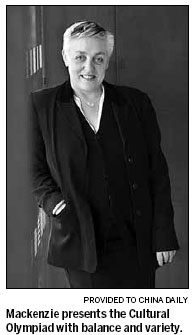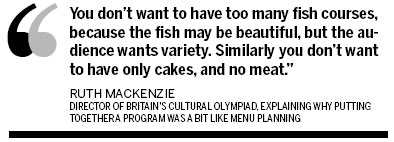Culture adds muscle to the Olympic experience
Updated: 2012-08-12 07:50
By Cecily Liu in London(China Daily)
|
|||||||||

Ruth Mackenzie, director of Britain's Cultural Olympiad, was in awe upon seeing pottery-made dancing women who once accompanied Chinese imperial tombs now exhibiting at Cambridge's Fitzwilliam Museum.
"These women, with their beautiful hands, are still in one piece after the centuries in the tombs. It really is fantastic, I mean, what a bargain to see these treasures for free," she says.
"Also those wonderful horses and beautiful gold jewelry are such wonderful, beautiful artifacts," she adds.
The blockbuster exhibition, The Search for Immortality: Tomb Treasures of Han China, is just one of the 12,000 events and exhibitions produced by 25,000 artists across 204 countries for the London 2012 Festival.
Running through Sept 9, the festival is the grand finale of the Cultural Olympiad, a four-year program of Olympics and Paralympics related arts events that Britain spent more than 97 million pounds ($144 million) to stage since 2008.
One highlight of the program is the World Shakespeare Festival, which invites international theater groups to stage Shakespeare plays at London's Globe Theater in their own languages. The National Theater of China performed Richard III in Mandarin this May.
Another is Stories of the World, a series of exhibitions across the UK using objects and artifacts to tell stories, which includes the Fitzwilliam Museum tomb treasures exhibition.
This series also include an exhibition of Hangzhou's exquisite silk dresses at Nottingham Castle Museum and another of ancient Chinese history at Colchester Castle Museum.
However, the Cultural Olympiad received widespread criticism for its lack of coherence in its initial two years. Mackenzie, former boss of Scottish Opera, Chichester Festival theater and the Manchester International Festival, was given the helm in 2010 to give the project a fresh start.
Quickly and decisively, she dropped projects that did not seem to work. "But I'm not going to tell you about them," she says with an air of mysteriousness. "I'm only going to tell you that there are lots of great ideas, like the World Shakespeare Festival, the BT River of Music, and the work on Unlimited, which were already in place."
She then opened her contacts book, and invited artists from all around the world to join in. "There was no bidding process, it's not about bureaucracy," although she concedes that the selection process was "subjective".
"It is me trying to come up with a program that I feel has balance and variety."
She says it's like cooking. "You don't want to have too many fish courses, because the fish may be beautiful, but the audience wants variety. Similarly you don't want to have only cakes, and no meat."
As well, Mackenzie relied on many of her former contacts to invite a wider network of artists. This includes David Jones, producer of the BT River of Music, who invited musicians from each of the 204 countries competing in the Olympics to perform along the Thames.
This includes a July 21 solo performance from Gong Linna, a famous Chinese singer who transformed traditional Chinese melodies and the qi (energy) of centuries-old Qin compositions into new songs.
Some events Mackenzie added to the program arguably could have taken place without the Cultural Olympiad, but the label gave them an extra boost in publicity. For example, Fitzwilliam Museum started working on the tomb treasures exhibition years ago.
As a testament to the cultural activities' inclusivity, London 2012 will offer 10 million free tickets or free places at events, and the Cultural Olympiad will involve more than 16 million people across the UK.
The tradition of the Cultural Olympiad originated with Pierre de Coubertin, founder of the modern Olympic movement, who believed that the Games could bring sport and culture together. The combination has become bigger each time, and has reflected what the host nation has to offer.
In 1992, Barcelona staged a four-year Cultural Olympiad, promoting local highlights including the Picasso Museum. A similar festival starting three years prior to the Sydney Olympics in 2000 put Australia's aboriginal people in the spotlight.
The Beijing Cultural Olympiad staged a plethora of traditional and modern culture events, including a film festival for fans of sport cinema and 1,500 young musicians performing on top of the Great Wall of China.
Mackenzie did not visit Beijing in 2008 because she did not know that she would later work on Britain's Cultural Olympiad.
"Personally, I am very enthusiastic about Chinese culture," she says, "but I was working on different things in 2008."
That may allow Mackenzie to create without the constraint of expectation. But how does she want her work to be remembered?
"I hope everyone who comes to the festival will be inspired by an artist, and that the world will look at our festival program and say, 'we must come to the United Kingdom and see its free museums, its brilliant theater, and its wonderful countryside and beaches, and see what fun we can have'."
cecily.liu@chinadaily.com.cn

(China Daily 08/12/2012 page4)